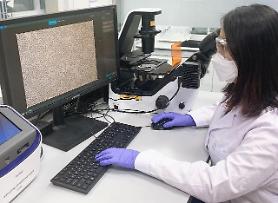
[Courtesy of ST Pharm]
SEOUL -- Clinical trials of a messenger RNA COVID-19 vaccine candidate developed by South Korea's government-sponsored consortium will begin in the first quarter of 2022 if approval comes from a state public health body. The consortium aims to develop mRNA vaccines with preventive effects that are more than equal to those commercialized by Pfizer and Moderna.
To develop homemade COVID-19 vaccines, South Korea has launched the so-called K-mRNA consortium involving three drug makers -- Hanmi Pharmaceutical, GC Pharma and ST Pharm, which have worked with a biopharmaceutical business association to establish a vaccine production and export base by securing technology for an mRNA vaccine platform.
ST Pharm said the consortium has submitted clinical trial plans for its vaccine candidate code-named "STP2104," which is based on modified nucleosides, to the Ministry of Food and Drug Safety. Nucleosides are important biological molecules that function as signaling molecules and as precursors to nucleotides needed for DNA and RNA synthesis.
Once approved, the consortium would launch first-stage clinical trials in South Korea and other countries from the first quarter of 2022. The consortium is also conducting a pre-clinical test of STP2130, another vaccine candidate that can prevent infections by COVID-19 delta mutations.
The K-mRNA consortium aims to produce 100 million doses that can inoculate the entire population twice per person. The consortium cooperates with companies affiliated with the Korea Innovative Medicines Consortium (KIMCo), which was formed in 2020 by a biopharmaceutical business group.
The novel coronavirus is studded with proteins that it uses to enter human cells. Spike proteins make a tempting target for potential vaccines and treatments. DNA vaccines transfect a specific antigen-coding DNA sequence onto the cells of an immunized species, while mRNA vaccines teach cells how to make a protein that triggers an immune response for the production of antibodies.
DNA vaccines are safer than mRNA vaccines but there is a disadvantage that raw material inputs are higher. The advantages of RNA vaccines include production speed and lower cost, but they may elicit an unintended immune reaction, and mRNA vaccines can be easily broken by small shocks, making them difficult to transport and store.
Copyright ⓒ Aju Press All rights reserved.



